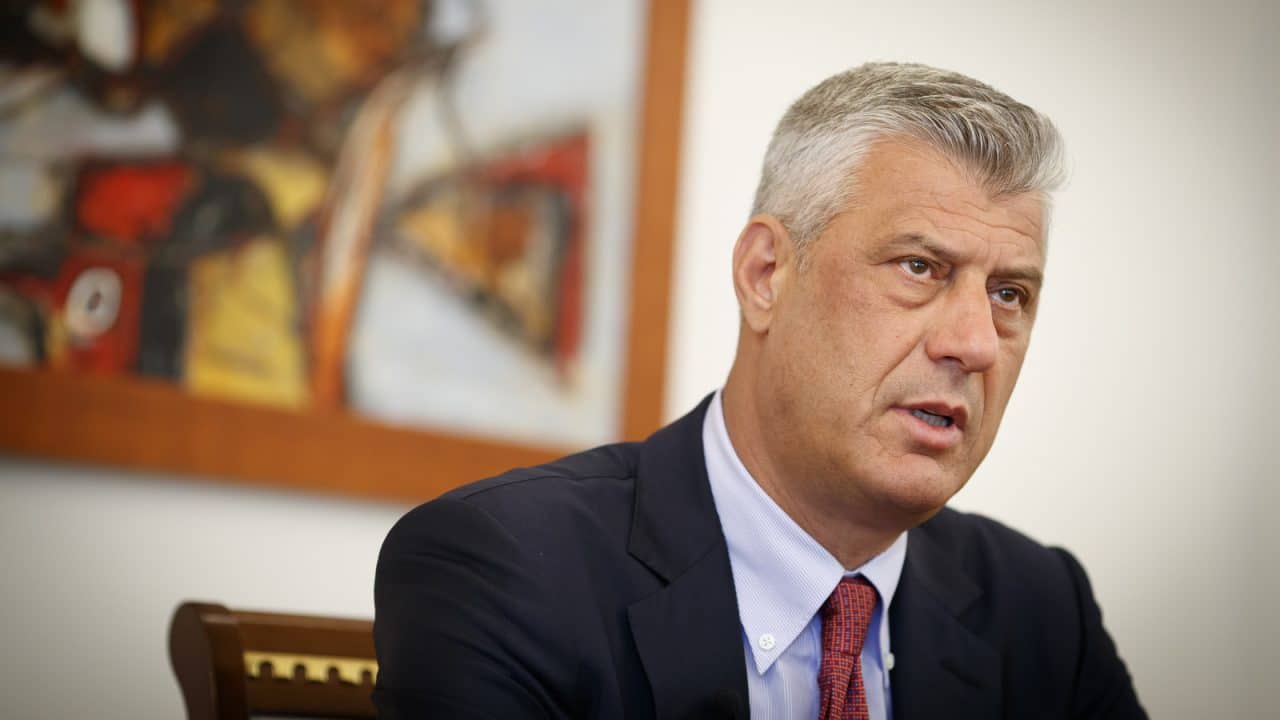As the over-mighty presidents of Kosovo and Serbia meet again without revealing much about their talks, the question is whether either of them has the mandate, the willpower – or the interest – to reach a final deal.
The presidents of both Kosovo and Serbia paid visits to Washington this week, and again circumvented the governments of their respective countries, reportedly making promises they have no legal right to make.
That complaint is almost laughable, however. Both presidents have got the world and their own citizens used to the idea that they are the ultimate powerbrokers; all other state institutions, like parliaments and prime ministers, are there just for decoration.
Hashim Thaci and Aleksandar Vucic are well-known guests in Washington, and it would seem that they have already made a draft agreement of what they both call “a solution to the crisis” between their countries.
For years, both men have used the “dialogue” between Kosovo and Serbia to serve their own political aspirations.
Everyone, from Brussels to Washington, has enabled these two strongmen to continue holding their citizens in deadlock while simultaneously providing them with a chance to draft agreements in secret, without making much fuss at home, until everything is agreed and their patrons bless their heroic efforts.
The problem is that neither Vucic nor Thaci truly represents the will of their people. This might sound like an easily dismissed argument, since we have got used to the fact that both men have transformed the parliaments in their countries into obsolete, head-nodding institutions.
Serbia’s government, with Ana Brnabic in charge, literally repeats everything Vucic says about “the dialogue” with Pristina – while also throwing in some racist remarks about Kosovo’s leadership, and showing off her disdain for her Kosovo counterpart, Albin Kurti, at the EBRD Investment Summit in London, where it appears the two did not exchange a word.
But Brnabic has Vucic’s strong back to fall on, while Kurti is in, what many in Kosovo call “a political war” with President Thaci – because Kurti rightly wants the government to take control of the dialogue with Serbia, among other things.
Elected as presidents, not as despotic rulers:

Serbian President Aleksandar Vucic in Belgrade, Serbia, 2020. Photo: EPA-EFE/ANDREJ CUKIC
What is the problem with that? While Thaci and Vucic were elected, and their legitimacy as presidents is indisputable, nobody in Kosovo or in Serbia made them kings, making all the political decisions, from the smallest appointments at a local level to the fate of the relations of Kosovo and Serbia.
But life in “young democracies” like Kosovo and Serbia is full of surprises, and it seems a dangerous rule has taken hold, whereby Thaci and Vucic are indeed considered kings, responsible to no one, and supported by the West.
This would not be so dangerous and undemocratic if their enablers, besides Russia and Turkey, weren’t also Washington and the EU. It seems that “the West” is making the same mistakes as before, proclaiming as “realpolitik” the most dangerous trends threatening Europe and the world – the rise of authoritarianism and despotic figures who are to be domesticated and taught good behaviour. We saw how this approach worked out in Hungary, Poland, the Czech Republic and so many other places, that openly threaten the EU’s very existence.
Vucic, meanwhile, came back from Washington with “bad news” – announced revealingly before he even met any US officials. His mouthpiece, the most widely circulated tabloid in Serbia, Informer,proclaimed that Vucic was “fighting the Battle of Kosovo in Washington”. [Reminder: the actual Battle of Kosovo in 1389, fought by Serbs and Albanians, ended in a defeat for Serbia that started five centuries of colonial rule by the Ottomans.]
This time around, before he departed for Washington, Vucic cryptically announced that an ultimatum was being prepared for him that “we can’t accept but must not refuse”.
Again, nobody quite understood what he was talking about. But this mystification helps him muddy the waters before the elections due in April, when the “Kosovo situation” will again be the centerpiece of his campaign – as it was for every politician in Serbia ever since it adopted its first constitution and became an independent state, 185 years ago. Since then, Serbia has adopted a new constitution or changed the previous one about every 16 years. We adopted the last one in 2006, 14 years ago.
Playing a double-game on the referendum:

12th anniversary of Kosovo’s independence in Pristina, Kosovo, 2020. Photo: EPA-EFE/VALDRIN XHEMAJ
Despite Vucic’s recent statement that he will “ask the people about Kosovo”, hinting at a possible referendum, we know already what needs to be done – Serbian recognition of Kosovo as an independent republic, which it already is, and changing the constitution, especially the preamble, a short fiction story about how Kosovo is still part of Serbia, which was written and supported by Serbian ultranationalists, Vucic included, back in 2006. To change the constitution, Vucic needs a two-thirds majority in the 250-seat parliament, while the referendum is optional (See Article 203).
However unclear, recent developments and “breakthroughs” in the Kosovo-Serbia dialogue play right into the hands of Vucic’s campaign for another mandate for his Progressive Party in the coming elections. His dominance of the media, which he largely controls, along with his fragmented and completely useless opposition – which takes an even harder right-wing stance when it comes to Kosovo than Vucic – begs the question: are the elections a prelude to an attempt to bring about the much-needed constitutional changes with regard to Kosovo?
Hopefully, with an all but certain new mandate, Vucic’s party will aim for that. But let’s not forget who Vucic is, or his recent political moves; they included lowering the threshold for parties and right-wing movements to win seats in parliament, which serves to push into the parliament many violent opponents of any normalization of relations between Kosovo and Serbia.
Unsurprisingly, Vucic is playing a double-game, as always, holding all the power in his hands while putting on a sad face before the West, declaring that the opposition – which he created in the first place – is against any solution.
Vucic has all the angles covered. He will remain effectively in control of every political decision with overwhelming public support while internationally continuing to play the role of a statesman who nobody at home seems to understand.
It wouldn’t be that surprising if he indeed takes the “nuclear” route, and calls a referendum on Kosovo, whatever that means, with binding results, but most likely unfavourable to any attempt at normalization; Vucic, his minions and their enablers from the US and the EU know very well that for the past eight years, ever since he took control, he has maintained and in fact enhanced a racist, toxic public discourse in Serbia about Kosovo Albanians.
Its time that Kosovo demanded a little respect:

Albin Kurti in Pristina, Kosovo, 2020. Photo: EPA-EFE/VALDRIN XHEMAJ
On the other hand, the Kosovo government led by Kurti seems to be stepping up and trying to take back control of country’s politics from the hands of the all-mighty President. The complicated situation within Kurti’s coalition will only bring more challenges and roadblocks that his government needs to overcome.
But why does the so-called international community still not respect Kosovo as a country with a political will of its own? How come only Serbia’s demands are accommodated? Why does only Serbia have the privileged status of a party that needs to be handled gently, like a crying baby?
It is high time that Kosovo started showing its political resilience and decisiveness when it comes to drawing its own red lines with its declared supporters from the West, who seem to care more about the Serbian President’s and people’s feelings than anything else.
Put in another perspective, can we even imagine a referendum in Kosovo in which Kosovo citizens were asked if they agreed to what is reportedly being nicely offered to Serbia – the de facto partition of Kosovo by the creation of a Serb-led proto-state, just like the RS in Bosnia? Why not? Don’t the people of Kosovo have the same rights as anybody else? Doesn’t the Kosovo government have a right to do what it deems appropriate for the people it governs?
Any kind of “compromise” in the Kosovo-Serbia dialogue should not only be pleasing to Serbia, which, history teaches us, is very hard to please, but acceptable also to the government chosen by the Kosovo people.
The Kosovo people have already expressed their will by electing Kurti as Prime Minister – no breaking up of Kosovo from its current borders, no more living in a ghetto because of Serbia’s bullying, no more corruption and political despotism. This, the will of the Kosovo people, above all, has to be respected, if anybody dreams of a feasible, long-term solution for future Serbia-Kosovo relations.
Miloš Ciric is a Serbian writer and human rights activist. He holds a master’s degree in Media studies from the School of Media Studies at The New School University in New York City, and a bachelor’s degree in political science from the Faculty of Political Sciences at the University of Belgrade, Serbia.
The opinions expressed in the opinion section are those of the authors only and do not necessarily reflect the views of BIRN.


